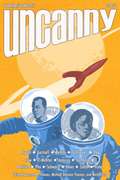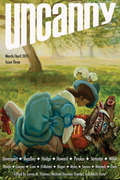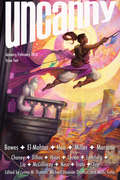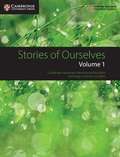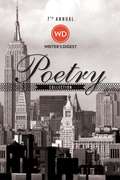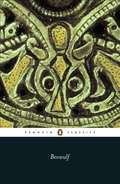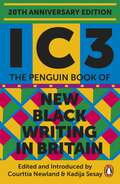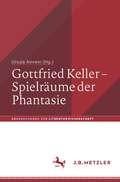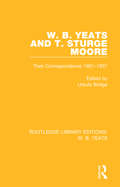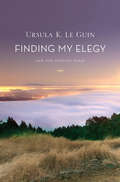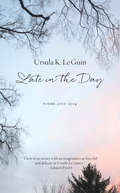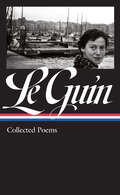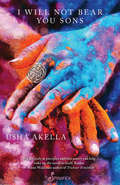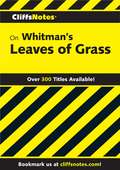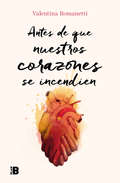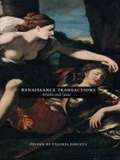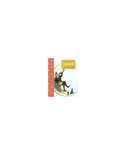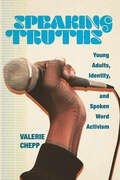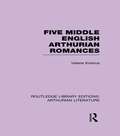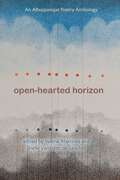- Table View
- List View
Uncanny Magazine Issue Six
by Uncanny MagazineFeaturing all–new short fiction by Paul Cornell, Isabel Yap, Liz Argall, Kenneth Schneyer, and Keffy R. M. Kehrli, classic fiction by N.K. Jemisin, nonfiction by Diana M. Pho, Steven H Silver, Michi Trota, and David J. Schwartz, poems by Rose Lemberg, Dominik Parisien, Amal El–Mohtar, and Jennifer Crow, interviews with Isabel Yap, and Liz Argall and Kenneth Schneyer, and Matthew Dow Smith’s The Future Matters on the cover.
Uncanny Magazine Issue Three
by Uncanny MagazineFeaturing all-new short fiction by Sofia Samatar, Rosamund Hodge, Kat Howard, Maria Dahvana Headley, Sarah Pinsker, Emily Devenport, and Fran Wilde, classic fiction by Ellen Klages, nonfiction by Ytasha L. Womack, Stephanie Zvan, Amal El–Mohtar, and L.M. Myles, poems by C.S.E. Cooney, Jennifer Crow, and M Sereno, interviews with Sofia Samatar, C.S.E. Cooney, and Ellen Klages, and Carrie Ann Baade’s Unspeakable #2 on the cover.
Uncanny Magazine Issue Two
by Uncanny MagazineFeaturing new fiction by Hao Jingfang (translated by Ken Liu), Sam J. Miller, Amal El-Mohtar, Richard Bowes, and Sunny Moraine, classic fiction by Ann Leckie, essays by Jim C. Hines, Erica McGillivray, Michi Trota, and Keidra Chaney, poetry by Isabel Yap, Mari Ness, and Rose Lemberg, interviews with Hao Jingfang (Ken Liu translating) and Ann Leckie by Deborah Stanish, and Julie Dillon’s Fortune’s Favored as the cover.
Stories Of Ourselves: Cambridge Assessment International Education Anthology Of Stories In English (Cambridge International Examinations Ser.)
by University of Cambridge ESOL ExaminationsThis series contains poetry and prose anthologies composed of writers from across the English-speaking world. Parts of Stories of Ourselves Volume 1 are set for study in Cambridge IGCSE®, O Level and International AS & A Level Literature in English courses. Each short story in this collection has its own unique voice and point of view. They may differ in form, genre, style, tone and origin, but all have been chosen because of their wide appeal. Written in English by authors from different countries and cultures, the anthology includes works by Charles Dickens, H.G. Wells, Virginia Woolf, Graham Greene, V.S. Naipaul, R.K Narayan, Janet Frame, Raymond Carver, Jhumpa Lahiri, Annie Proulx and many others.
7th Annual Poetry Collection
by UnknownThis exclusive collection contains the top fifty winning entries of the 6th Annual Writer’s Digest Poetry Competition, including the First-Place winner, “AN EDUCATED WOMAN EXPLAINS WHY SHE LIKES BLUEGRASS” BY LINDA NEAL RESING.
Beowulf
by UnknownBeowulf is the greatest surviving work of literature in Old English, unparalleled in its epic grandeur and scope. It tells the story of the heroic Beowulf and of his battles, first with the monster Grendel, who has laid waste to the great hall of the Danish king Hrothgar, then with Grendel's avenging mother, and finally with a dragon that threatens to devastate his homeland. Through its blend of myth and history, Beowulf vividly evokes a twilight world in which men and supernatural forces live side by side. And it celebrates the endurance of the human spirit in a transient world."Alexander's translation is marked by a conviction that it is possible to be both ambitious and faithful [and] ...communicates the poem with a care which goes beyond fidelity-to-meaning and reaches fidelity of implication. May it go on ... to another half-million copies." - Tom Shippey, Bulletin of the International Association of University Professors of English
Ic3: The Penguin Book of New Black Writing in Britain
by UnknownA celebratory 20th anniversary edition of A landmark collection from black writers across the literary spectrum'The fact that IC3, the police identity for Black, is the only collective term that relates to our situation here as residents ('Black British' is political and refers to Africans, Asians, West Indians, Americans and sometimes even Chinese) is a sad fact of life I could not ignore' from Courttia Newland's Introduction, 2000First published twenty years ago into a different literary landscape, IC3 showcases the work of more than 100 black British authors, celebrating their lasting contributions to literature and British culture. It spans a wealth of genres to demonstrate the range and astonishing literary achievements of black writers, including:Poetry from Roger Robinson, Bernardine Evaristo, Jackie Kay and Benjamin Zephaniah. Short stories from Ferdinand Dennis, Diana Evans, Catherine Jonson, E.A. Markham and Ray Shell.Essays from Floella Benjamin, Linda Bellos, Treva Etienne, Kevin Le Gendre and Labi Siffre.Memoirs from Margaret Busby, Henry Bonsu, Buchi Emecheta, Leone Ross, and many others.Featuring a new introduction from original editors Kadija Sesay and Courttia Newland, this collection reflects on the legacy of these writers, their extraordinary work, and stands as a reminder that black British writers remain underrepresented in literature today.
Gottfried Keller – Spielräume der Phantasie (Abhandlungen zur Literaturwissenschaft)
by Ursula AmreinDie in diesem Band versammelten Beiträge zeigen Keller als einzigartigen Erzähler, richten den Blick auf Texte aus dem Nachlass, gehen seinen Träumen und Phantasien nach, verfolgen seine Spuren als Maler, diskutieren seine Theaterprojekte, erläutern seine Beziehung zur Musik und vergegenwärtigen ihn als Politiker. Lektüren, die diesen unterschiedlichen Zusammenhängen Rechnung tragen, bringen pointiert neue Erkenntnisse in die Auseinandersetzung mit Gottfried Keller und seinem Werk ein.
W. B. Yeats and T. Sturge Moore: Their Correspondence 1901-1937 (Routledge Library Editions: W. B. Yeats #2)
by Ursula BridgeThe letters in this book, first published in 1953, throw light on the literary scene at a time in which William Butler Yeats and Thomas Sturge Moore regularly corresponded. In the early days of their friendship Yeats and Sturge Moore often saw each other in London where they both played an active part in the literary and artistic scene. When Yeats later lived chiefly in Ireland and Sturge Moore spent much of his time in the country and abroad they met less often but kept in touch by letter. Many of these letters, and therefore a record of their friendship, has been preserved and presented in this book. This title will be of interest to students of literature and literary history.
Finding My Elegy: New and Selected Poems
by Ursula K. Le Guin"[Le Guin] never loses touch with her reverence for the immense what is." — Margaret AtwoodThough internationally known and honored for her imaginative fiction, Ursula K. Le Guin started out as a poet, and since 1959 has never ceased to publish poems. Finding My Elegy distills her life's work, offering a selection of the best from her six earlier volumes of poetry and introducing a powerful group of poems, at once earthy and transcendent, written in the first decade of the twenty-first century.The fruit of over a half century of writing, the seventy selected and seventy-seven new poems consider war and creativity, motherhood and the natural world, and glint with humor and vivid beauty. These moving works of art are a reckoning with a whole life.
Late in the Day: Poems 2010–2014
by Ursula K. Le Guin"There is no writer with an imagination as forceful and delicate as Ursula K. Le Guin's." —Grace Paley Late in the Day, Ursula K. Le Guin's new collection of poems (2010–2014) seeks meaning in an ever-connected world. In part evocative of Neruda's Odes to Common Things and Mary Oliver's poetic guides to the natural world, Le Guin's latest give voice to objects that may not speak a human language but communicate with us nevertheless through and about the seasonal rhythms of the earth, the minute and the vast, the ordinary and the mythological. As Le Guin herself states, "science explicates, poetry implicates." Accordingly, this immersive, tender collection implicates us (in the best sense) in a subjectivity of everyday objects and occurrences. Deceptively simple in form, the poems stand as an invitation both to dive deep and to step outside of ourselves and our common narratives. The poems are bookended with two short essays, "Deep in Admiration" and "Some Thoughts on Form, Free Form, Free Verse."
Ursula K. Le Guin: Collected Poems (LOA #368)
by Ursula K. Le GuinAt last, a major American poet collected for the first time in the sixth volume of the definitive Library of Edition of her worksIn his last book, Harold Bloom presents the earthy, surprising, and lyrical poetry of Ursula K. Le GuinUrsula K. Le Guin&’s career began and ended with poetry. This sixth volume in the definitive Library of America edition of her works gathers, for the first time, her collected poems—from her earliest collection Wild Angels (1974) through her final publication, the collection So Far So Good, which she delivered to her editor just a week before her death in 2018. The themes explored in the poems gathered here resonate through all Le Guin&’s oeuvre, but find their strongest voice in her poetry: exploration as a metaphor for both human bravery and creativity, the mystery and fragility of nature and the impact of humankind on their environment, the Tao Te Ching, marriage, womanhood, and even cats. Le Guin&’s poetry is often traditional in form but never in style: her verse is earthy, surprising, and lyrical. Including some 40 poems never before collected, this volume restores to print much of Le Guin's remarkable verse. It features a new introduction by editor Harold Bloom, written before his death in 2019, in which he reflects on the power of Le Guin&’s poems, which he calls &“American originals.&” It also features helpful explanatory notes and a chronology of Le Guin&’s life.
I Will Not Bear You Sons
by Usha AkellaA poem can glisten like a fresh wound. Usha Akella pays tribute to her own life and to that of other women. Writing from her Niyogi Brahmin sensibility with which she grew up, her poems are the medium for the unsilenced voice both of her own story and those of women across various cultures. She calls for a united womanhood in her poems dedicated to women violated through rape, caste, FGM, foot binding, mysticism, politics, terrorism and other patriarchal abuses to the women who have triumphed against subjugation building new ways of being. Rage has not caste, needs no algorithm,light a pyre with itof chopped thumbs and scripted dreams
Mira Bai
by Usha S. NilssonA monograph in English by Usha S. Nilsson on the medieval Saint-poetess of Rajasthan.
CliffsNotes on Whitman's Leaves of Grass
by V. A. ShahaneThis CliffsNotes guide includes everything you’ve come to expect from the trusted experts at CliffsNotes, including analysis of the most widely read literary works.
Kunchan Nampyar
by V. S. SharmaThe life and works of Kunchan Nampyar, an 18th century Malayalam poet.
Antes de que nuestros corazones se incendien
by Valentina RomanettiComo si el final no estuviera escrito, como si fuera la última vez, Antes de que nuestros corazones se incendien es mi declaración de amor. Soy Alba Pariente Bueno, nací en Rueda (Valladolid), tengo veintidós años y muchos sueños por cumplir. Estudio Publicidad y Relaciones Públicas, y la vida me ha traído a Madrid. Cuando era pequeña jugaba en el Parque Los Poetas. ¿Casualidad? No lo sé. Con nueve años escribí mis primeros poemas, y en plena adolescencia la vida me volvió a conducir a la poesía. Así nació Valentina Romanetti, mi voz silenciosa, pero la que más grita. Valentina es la valentía de Alba, y Romanetti es una bonita manera de decir que aun estando en ruinas, como Roma, puedes ser preciosa. Y esa valentía se transformó en las páginas de Vorágine, mi primer libro. Ahora, en Antes de que nuestros corazones se incendien, amaremos como si el final no estuviera escrito, como si fuera la última vez que el corazón nos deja hacerlo.
Renaissance Transactions: Ariosto and Tasso
by Valeria FinucciThe controversy generated in Italy by the writings of Ludovico Ariosto and Torquato Tasso during the sixteenth century was the first historically important debate on what constitutes modern literature. Applying current critical theories and tools, the essays in Renaissance Transactions reexamine these two provocative poet-thinkers, the debate they inspired, and the reasons why that debate remains relevant today. Resituating these writers' works in the context of the Renaissance while also offering appraisals of their uncanny "postmodernity," the contributors to this volume focus primarily on Ariosto's Orlando furioso and Tasso's Gerusalemme liberata. Essays center on questions of national and religious identity, performative representation, and the theatricality of literature. They also address subjects regarding genre and gender, social and legal anthropology, and reactionary versus revolutionary writing. Finally, they advance the historically significant debate about what constitutes modern literature by revisiting with new perspective questions first asked centuries ago: Did Ariosto invent a truly national, and uniquely Italian, literary genre--the chivalric romance? Or did Tasso alone, by equaling the epic standards of Homer and Virgil, make it possible for a literature written in Italian to attain the status of its classical Greek and Latin antecedents? Arguing that Ariosto and Tasso are still central to the debate on what constitutes modern narrative, this collection will be invaluable to scholars of Italian literature, literary history, critical theory, and the Renaissance.Contributors. Jo Ann Cavallo, Valeria Finucci, Katherine Hoffman, Daniel Javitch, Constance Jordan, Ronald L. Martinez, Eric Nicholson, Walter Stephens, Naomi Yavneh, Sergio Zatti
Poetry Basics: Limericks
by Valerie BoddenAn introduction to the poetic form known as the limerick, from its origins in the 1600s to today. Example poems and analysis explore such elements as wit and nonsense.
Speaking Truths: Young Adults, Identity, and Spoken Word Activism
by Valerie CheppThe twenty-first century is already riddled with protests demanding social justice, and in every instance, young people are leading the charge. But in addition to protesters who take to the streets with handmade placards are young adults who engage in less obvious change-making tactics. In Speaking Truths, sociologist Valerie Chepp goes behind-the-scenes to uncover how spoken word poetry—and young people’s participation in it—contributes to a broader understanding of contemporary social justice activism, including this generation’s attention to the political importance of identity, well-being, and love. Drawing upon detailed observations and in-depth interviews, Chepp tells the story of a diverse group of young adults from Washington, D.C. who use spoken word to create a more just and equitable world. Outlining the contours of this approach, she interrogates spoken word activism’s emphasis on personal storytelling and “truth,” the strategic uses of aesthetics and emotions to politically engage across difference, and the significance of healing in sustainable movements for change. Weaving together their poetry and personally told stories, Chepp shows how poets tap into the beautiful, emotional, personal, and therapeutic features of spoken word to empathically connect with others, advance intersectional and systemic analyses of inequality, and make social justice messages relatable across a diverse public. By creating allies and forging connections based on friendship, professional commitments, lived experiences, emotions, artistic kinship, and political views, this activist approach is highly integrated into the everyday lives of its practitioners, online and face-to-face. Chepp argues that spoken word activism is a product of, and a call to action against, the neoliberal era in which poets have come of age, characterized by widening structural inequalities and increasing economic and social vulnerability. She illustrates how this deeply personal and intimate activist approach borrows from, builds upon, and diverges from previous social movement paradigms. Spotlighting the complexity and mutual influence of modern-day activism and the world in which it unfolds, Speaking Truths contributes to our understanding of contemporary social change-making and how neoliberalism has shaped this political generation’s experiences with social injustice.
Five Middle English Arthurian Romances (Routledge Library Editions: Arthurian Literature #6)
by Valerie KrishnaThe poems in this collection will give the reader an appreciation of both the distinctiveness and the variety of the medieval English Arthurian tradition and highlight some of this important chapter in Arthurian legend literature.
Open-Hearted Horizon: An Albuquerque Poetry Anthology (Albuquerque Poet Laureate Series)
by Valerie Martínez and Shelle VanEtten de SánchezOpen-Hearted Horizon: An Albuquerque Poetry Anthology invites you into a poetic conversation. The anthology includes a wide range of Albuquerque-based poets and poems that are inspired—directly, associatively, obliquely—by Albuquerque, New Mexico, as a place and as a community. Anthologies commonly celebrate a multitude of voices. Because this one is place-based, it aims to draw you into a circle that deepens your sense of place and people, of contexts and cultures, whether you know Albuquerque or not. Because the Albuquerque poetry community is characterized by its support for individual writers and by a strong impulse toward creative collaboration, Open-Hearted Horizon features poems in multiple voices. In addition to poems by individual poets, this collection also features collaborative works, including those by the EKCO collective and one that features a line from every poem in the anthology. Overall, the collection invites you to experience Albuquerque in all its richness, diversity, and depth.
